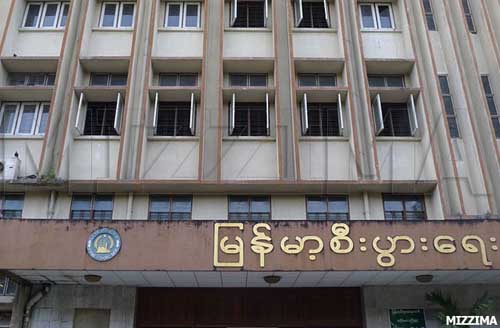(Interview) – The Burmese government is looking into changing its foreign exchange rate system, in an effort to stabilize the system and help businesses compete more effectively. Mizzima reporter Ko Wild interviewed Rangoon Economics Institute retired professor Maw Than about changing to a new exchange rate system and its affect on the economy.

Question: How do you view the current exchange rate system? Should it be determined by the market or by the government?
Answer: In other countries, the exchange rate functions within a prescribed framework and it fluctuates with market forces. It’s important to control the fluctuations within prescribed limits.
Q: What benefits will accrue to the business community if a new exchange rate system is adopted?
A: Businesses will function better if a new exchange rate is fixed. Suppose you export a commodity and earn US$ 1,000. And then you have to convert this foreign money to Burmese currency again. If the exchange rate is stable and fluctuates only 2-3 per cent, you can predict your export business earnings in Burmese currency very accurately. Similarly the importers can predict the import costs of their commodities better.
Under the current system, the monetary authority fixes the exchange rate in the country. For instance, the prescribed exchange rate will be from 750 to 1,000 kyat against the dollar but this prescribed rate will fluctuate based on a demand-supply mechanism. The monetary authority must intervene in the market to control the prescribed exchange rate in the allowable limits by selling and buying dollars in the market. They must buy dollars when the dollar is flooded in the market and the price is falling. Similarly, they must sell Euro in the market when this currency is scarce in the market and the price is surging. Only with such intervention can the prescribe exchange rate be meaningful.
Q: Fixing an exchange rate should be based on what factors?
A: Fixing an exchange rate will be meaningful only if it is stable and can be controlled. In fixing an exchange rate, the broad factors must be considered. For instance, wages in the country, farmers’ wages in the agricultural sector, input costs in agribusiness such as costs for fertilizers, costs for diesel in water pumping, total costs based on per acre yields, etc. The exchange rate should be fixed based on all of these factors. For imported commodities, we must consider the disposable income of the people. The exchange rate should be within such limits. The exchange rate should be based on all these factors.
Q: How do you see the current exchange rate of 6 kyat against the US dollar?
A: It is not in parity with the virtual exchange rate in the black market. There is a great difference between the official exchange rate and the actual exchange rate in the market. So no one considers it as the workable exchange rate. The actual dollar exchange rate has risen from 250 kyat against the dollar to 350-500-700-1,000-1,2000 gradually. There is an actual exchange rate in the market and the dollar is traded at this rate. The business community will welcome it if the dollar exchange rate can be fixed at a certain rate. At the moment, this new rate will be an advantage to some and a disadvantage to others. But in the long run, the advantages and disadvantages will be temporary and it will be beneficial to all.
Q: Now the dollar price is falling and Burmese currency is rising.
A: Yes, the dollar price was at only 770-780 kyat on August 2, because the dollar is falling in the world markets. This is the main reason. The Japanese Yen against the US dollar is at 76-77 yen, from a previous rate of over 100. This is the comparison with the nearest Asian currency. Another reason is an oversupply of dollars in the market, flowing in from oil and gas exports and the sale of gemstones. When businessmen convert their dollar earnings into Burmese currency again, an oversupply of dollars takes place in the market.
Q: Do you think Burma needs the assistance of world financial institutions in fixing a stable foreign exchange rate?
A: In intervening in the market, we need enough capital reserves for selling and buying the foreign exchanges in the market. If we have enough foreign currency reserves, we can do it ourselves, and we don’t need assistance from others. But wealthy countries and individuals can ruin our market by injecting their short-term speculating money into our market. So we need international agreements and international institutions to control our market. We need to control these big companies so that they do not sell their dollars in our market when the dollar is in oversupply. The turnover of these big foreign companies is bigger than the national income of some countries. So they can thrash our markets. They can ruin our markets with their reserves. Financially we cannot compete with them in the market. So we need assistance from world financial institutions such as the World Bank (WB) and the International Monetary Fund (IMF).
Financial institutions like the WB and IMF must control and intervene in the market. But they will not give financial assistance. They have their own yardsticks in giving assistance in such situations, for instance the openness of the government, the democracy status in the country, etc. If they are satisfied with these parameters, they will help us.



